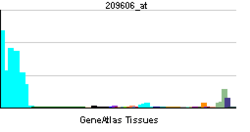PSCDBP
Cytohesin-interacting protein is a protein that in humans is encoded by the CYTIP gene.[3][4][5][6]
The protein encoded by this gene contains 2 leucine zipper domains and a putative C-terminal nuclear targeting signal, and it does not have any hydrophobic regions. This protein is expressed weakly in resting NK and T cells.[6]
References
- ↑ "Human PubMed Reference:".
- ↑ "Mouse PubMed Reference:".
- ↑ Dixon B, Sahely B, Liu L, Pohajdak B (Jan 1994). "Cloning a cDNA from human NK/T cells which codes for an unusual leucine zipper containing protein". Biochim Biophys Acta. 1216 (2): 321–4. doi:10.1016/0167-4781(93)90165-a. PMID 8241278.
- ↑ Kim HS (Jun 1999). "Assignment of the human B3-1 gene (PSCDBP) to chromosome 2 band q11.2 by radiation hybrid mapping". Cytogenet Cell Genet. 84 (1-2): 95. doi:10.1159/000015226. PMID 10343115.
- ↑ Tang P, Cheng TP, Agnello D, Wu CY, Hissong BD, Watford WT, Ahn HJ, Galon J, Moss J, Vaughan M, O'Shea JJ, Gadina M (Mar 2002). "Cybr, a cytokine-inducible protein that binds cytohesin-1 and regulates its activity". Proc Natl Acad Sci USA. 99 (5): 2625–9. doi:10.1073/pnas.052712999. PMC 122398
 . PMID 11867758.
. PMID 11867758. - 1 2 "Entrez Gene: PSCDBP pleckstrin homology, Sec7 and coiled-coil domains, binding protein".
Further reading
- Mansour M, Lee SY, Pohajdak B (2002). "The N-terminal coiled coil domain of the cytohesin/ARNO family of guanine nucleotide exchange factors interacts with the scaffolding protein CASP.". J. Biol. Chem. 277 (35): 32302–9. doi:10.1074/jbc.M202898200. PMID 12052827.
- Strausberg RL, Feingold EA, Grouse LH, et al. (2003). "Generation and initial analysis of more than 15,000 full-length human and mouse cDNA sequences.". Proc. Natl. Acad. Sci. U.S.A. 99 (26): 16899–903. doi:10.1073/pnas.242603899. PMC 139241
 . PMID 12477932.
. PMID 12477932.
- Boehm T, Hofer S, Winklehner P, et al. (2003). "Attenuation of cell adhesion in lymphocytes is regulated by CYTIP, a protein which mediates signal complex sequestration.". EMBO J. 22 (5): 1014–24. doi:10.1093/emboj/cdg101. PMC 150334
 . PMID 12606567.
. PMID 12606567.
- Gerhard DS, Wagner L, Feingold EA, et al. (2004). "The status, quality, and expansion of the NIH full-length cDNA project: the Mammalian Gene Collection (MGC).". Genome Res. 14 (10B): 2121–7. doi:10.1101/gr.2596504. PMC 528928
 . PMID 15489334.
. PMID 15489334.
- Hillier LW, Graves TA, Fulton RS, et al. (2005). "Generation and annotation of the DNA sequences of human chromosomes 2 and 4.". Nature. 434 (7034): 724–31. doi:10.1038/nature03466. PMID 15815621.
- Chen Q, Coffey A, Bourgoin SG, Gadina M (2006). "Cytohesin binder and regulator augments T cell receptor-induced nuclear factor of activated T Cells.AP-1 activation through regulation of the JNK pathway.". J. Biol. Chem. 281 (29): 19985–94. doi:10.1074/jbc.M601629200. PMID 16702224.
- MacNeil AJ, Mansour M, Pohajdak B (2007). "Sorting nexin 27 interacts with the Cytohesin associated scaffolding protein (CASP) in lymphocytes.". Biochem. Biophys. Res. Commun. 359 (4): 848–53. doi:10.1016/j.bbrc.2007.05.162. PMID 17577583.

 . PMID 11867758.
. PMID 11867758. . PMID 12477932.
. PMID 12477932. . PMID 12606567.
. PMID 12606567. . PMID 15489334.
. PMID 15489334.